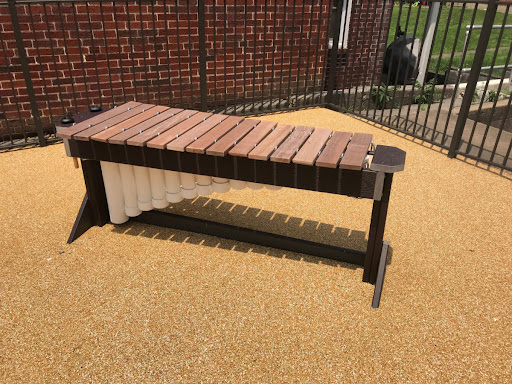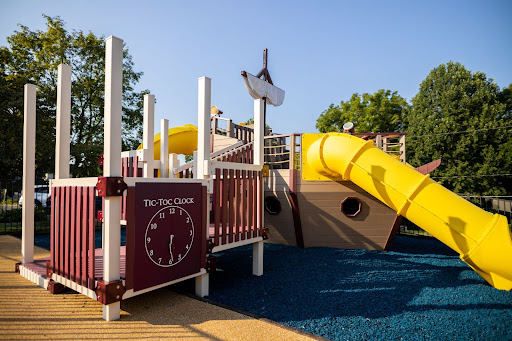Every parent knows that the early years of their child’s life are crucial for development. As the number of two working-parent households continues to increase, the need to pursue quality childcare options is vital. With over 600 thousand daycares in business in the United States, how can your daycare stand apart?
Through the use of sensory activity panels and interactive play, commercial daycare playsets can jumpstart social, emotional, and cognitive development in children and build trust between parents and your organization.
Read on to learn the importance of play-based learning, and how your daycare playset can help your organization achieve it.
What Is Play-Based Learning?
Play-based learning is exactly what it sounds like — it’s the act of learning new skills or discoveries through play. When done right, this type of play can help children build a positive relationship with learning because they have some autonomy in the matter.
The University of New Hampshire describes play-based learning as a continuum that ranges from child-directed play on one end to teacher-directed play on the other. Where the type of play falls along the spectrum depends on the role of the adult and the freedom of the child.
It differs from traditional academic learning because it’s:
- Self-chosen: the child chooses the task they’d like to participate in without direction from the teacher or caretaker.
- Enjoyable: the child enjoys the task at hand; it should be a positive experience.
- Process-oriented: there is no “end goal;” the child learns as they try new things.
- Unstructured: there are no rules; children can play and explore without the fear of failure.
These aspects of play-based learning motivate children to learn more about themselves and the world around them. It gives them an opportunity to take control of their learning environment and engage with the people, objects, and tasks that appeal to their interests.
Play-Based Learning on Daycare Playsets
Daycare playsets are one of the best places for play-based learning to occur. Aside from the inherent physical benefits they provide children as they climb and explore the different features of the playset, they also encourage creativity and social interaction.
When they’re equipped with the right play features and accessories, the likelihood that play-based learning will occur is multiplied. There are plenty of unique play accessories like megaphones or telescopes on the market, but we recommend exploring activity panels.

What Are Activity Panels?
Activity panels are unique play features that stimulate the learning of age-appropriate skills through play. Their purpose is to create a new sensory experience that encourages children to use their imagination, problem-solve, or interact with other children their age.
Sound familiar? Their purpose is almost identical to the purpose of play-based learning. That’s why activity panels make a great addition to daycare playsets.
4 Types of Activity Panels
There are hundreds of different activity panels to choose from, but all of them fall loosely into 4 general categories: math and science, sound and music, cognitive, and tactile panels.
1. Math & Science Panels
The purpose of math and science panels is to introduce young children to certain concepts through a game or a hands-on activity.
A weather activity is a common example of a math and science-focused panel. On a weather panel, children must use their knowledge of the climate and their perception of the environment to answer prompts related to current temperature or weather conditions.
2. Sound & Music Panels
Sound and music panels give children the opportunity to increase their auditory awareness. As they interact with panels that make noise, they’re developing their ear for sound.
This xylophone panel is a good example of a music panel where children explore the cause and effect of sound. As they play, they can experiment with different strengths or angles of the mallet to observe how the strike of the mallet impacts the sound of the xylophone.
Through experience, they’ll fine-tune their strike method to create the sound they find most desirable or interesting.

3. Cognitive Panels
Cognitive activity panels encompass a large range of skills. They include any panels that strengthen critical thinking like memory or matching games, or panels that inspire make-believe play.
One of Swing Kingdom’s most popular cognitive activity panels is the fire truck panel. This play feature is designed to initiate some make-believe play. It’s designed to look like a firetruck, and it’s even equipped with a steering wheel so children can pretend they’re driving the truck!
We also offer clock, alphabet, tic-tac-toe, and castle panels to accommodate a range of ages and interests!
4. Tactile Panels
The purpose of tactile panels is to create a sensory-dense experience. Typically, they’ll stimulate the sense of touch using different textures and shapes. They are great options for kids with disabilities or those who might be developing slower than some of their peers because they are inclusive and ADA accessible.
An example of a tactile panel is a gear panel. As children spin the gear and watch the others move with it, they learn cause and effect while practicing their hand-eye coordination and fine motor skills. The different sizes of the gears and their grooves help develop and enrich that sensory experience by providing a range of textures to interact with.
How Activity Panels Align With Play-Based Learning Objectives
There are 3 main benefits that activity panels bring to daycare playsets. Interestingly enough, those benefits align with the goals of play-based learning. Here are three reasons to include activity panels on your playset if your goal is to facilitate play-based learning.
1. Strengthen Tactile Skills
By nature, activity panels build tactile skills. Regardless of what category of panel they fall under, almost all activity panels require children to use their fine motor skills as they touch and manipulate the items on the board.
New sensory experiences are what drive play-based learning. Tactile learning occurs as they discover how to move and play with the items on the activity panel, overall strengthening their sense of touch.
2. Improve Cognitive Development
Playset activity panels help promote cognitive development through logic puzzles, matching games, and make-believe play. When play-based learning is facilitated correctly, it should do the same.
Puzzles and logic games are challenging, but ultimately fun to play when children learn how to solve them. Using cognitive activity panels, children can experience unstructured, enjoyable play-based learning that increases their knowledge of the world around them.
3. Build Confidence
Like anything in life, confidence is built through small successes. When a child masters a task or solves a puzzle on an activity panel, it boosts their confidence to try something new in the future.
Successful play-based learning should also boost confidence in children. Since it’s self-led without direction from the teacher, they feel less anxiety about making mistakes because there is no “right” or “wrong” way to complete the task.
When they’re broken down together, it’s easy to see how the concept of play-based learning aligns with the benefits that activity panels bring to daycare playsets.

